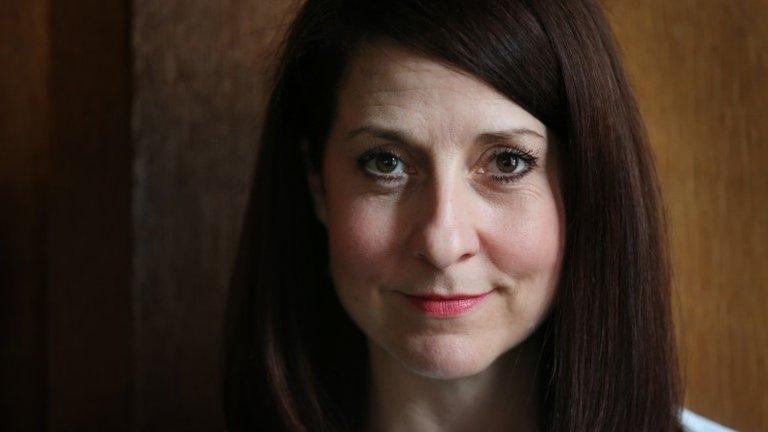Labour leadership: Has Yvette Cooper left it too late?
- Published
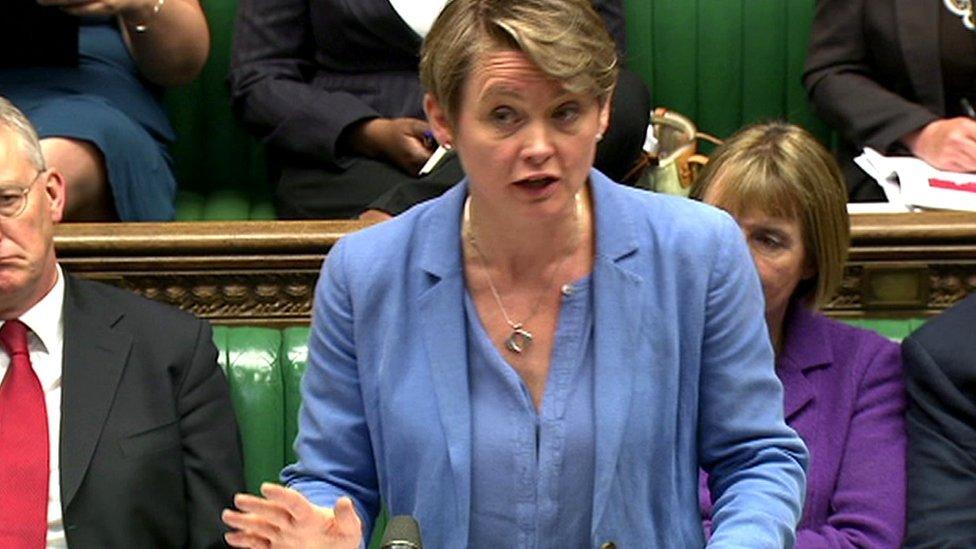
In the fourth of a series of in-depth profiles of the Labour leadership candidates, Iain Watson catches up with Yvette Cooper.
The last week of Yvette Cooper's leadership campaign isn't exactly how she predicted it.
She has spent more time in Parliament than on the stump. As shadow home secretary she has been leading her party's response to the refugee crisis - initially calling on the government to do more, and now pressing for some of those families who have already fled to Europe to be resettled here.
This has helped, rather than harmed, her leadership chances but has also meant more conventional campaigning has had to be discarded.
"I tend to respond most strongly to the most serious issues but I'm trying to keep this apart from the leadership contest, and trying to get cross party agreement to an appropriate response to the refugee crisis," she tells me.
While I met her rivals "on the road" at rallies and meetings, we meet in her parliamentary office.
'Best chance'
She was on the front bench for David Cameron's statement on Monday, then was granted her own emergency debate on the crisis on Tuesday, and had sat alongside Harriet Harman - for whom she worked when Labour was in opposition in the 1990s - for her last Prime Minister's Questions on Wednesday.
She still hopes to be taking over from her old boss when Labour's new leader is announced on Saturday but her team admits it will be an uphill struggle. She seems to be ending the campaign strongly, but has she left it too late?
"The next week will define the next ten years' she declares.
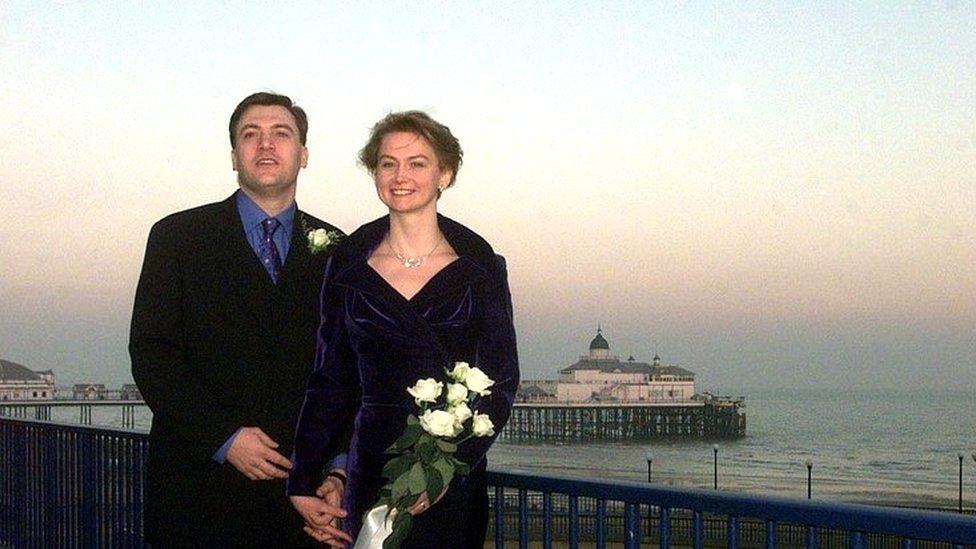
Yvette Cooper married Ed Balls in 1998
"My message now is look, we lost in 2015, it's really hard to win general elections -we need the best chance of doing so and a lot of people who depend on us will be let down if we veer away from the challenges of the future and look back to our party's history."
Translated, that is please don't back Jeremy Corbyn. But she admits that her campaign got off to a slow start.
Mining community
"Some people were planning their leadership campaigns for a long time. I wasn't.
"We were doing things from scratch. In the first month of the campaign I found it hard to come out of the shadow of the general election which we were so devastated at losing. I would go to meetings and people were just on the floor."
But, she says, she has been consistent throughout her campaign in arguing for high quality manufacturing jobs, doubling investment in science, and for free childcare.
So what brought her into politics in the first place?
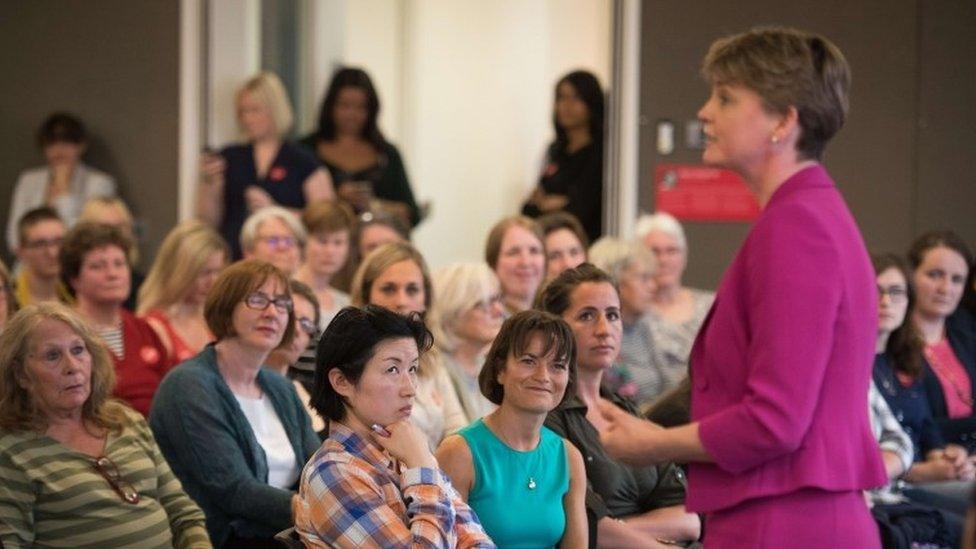
The Cooper campaign has focused on equality for women
"My dad (Tony) was a full time trade unionist. My mother came from a mining community so it was a Labour family but we didn't talk about party politics - we talked about issues and ideas.
"I first got involved campaigning against Section 28 (Conservative legislation that banned promotion of homosexuality a a 'pretended family relationship' in schools in England) -and I went with my Dad on the People's March for Jobs when I was 12 or 13."
She was born in 1969 so her teenage years were spent under Margaret Thatcher's government.
'White socks'
But she didn't just rebel against the Conservative administration. She said she shunned CND and has always been a multilateralist - "that was a controversial thing to be as a teenager in the eighties" - and it put her out of step with Labour's policy at the time.
If Jeremy Corbyn wins the party leadership, she might find herself a rebel again. 'At least I have been consistent!' she says with a smile.
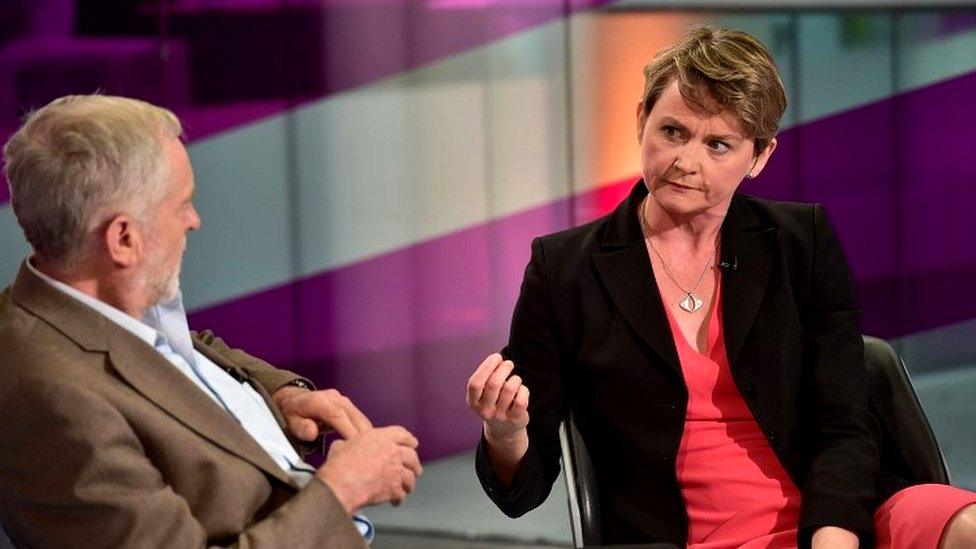
Cooper has challenged frontrunner Jeremy Corbyn's policies
She has said she would consider challenging the current government's forthcoming legislation on trade unions in the courts and revealed she had been involved in strike action herself as a youngster -at Eggar's comprehensive (now a specialist science school) in Hampshire.
"I organised a prefect's strike - one of the boys was facing the sack for wearing white socks to school."
I ventured that this sounded like a very sensible educational establishment.
'Yes, the socks were awful - but we showed solidarity. We were supposed to be patrolling the school but we huddled in a classroom one lunchtime instead because of Andrew's socks."
'On benefits'
While she had a happy childhood, she struggled early in her working life. At 24, while at Westminster working with Harriet Harman and Labour's Treasury team, she contracted ME, or chronic fatigue syndrome. It shaped her views on welfare.
"It was a miserable time, I had 'flu and it just didn't go away. I couldn't work for 12 months - I hated every minute of it and I was desperate to get back to my job.
"I had to claim benefits - if I hadn't I wouldn't have been able to pay the rent. It taught me you never know when things will go wrong.
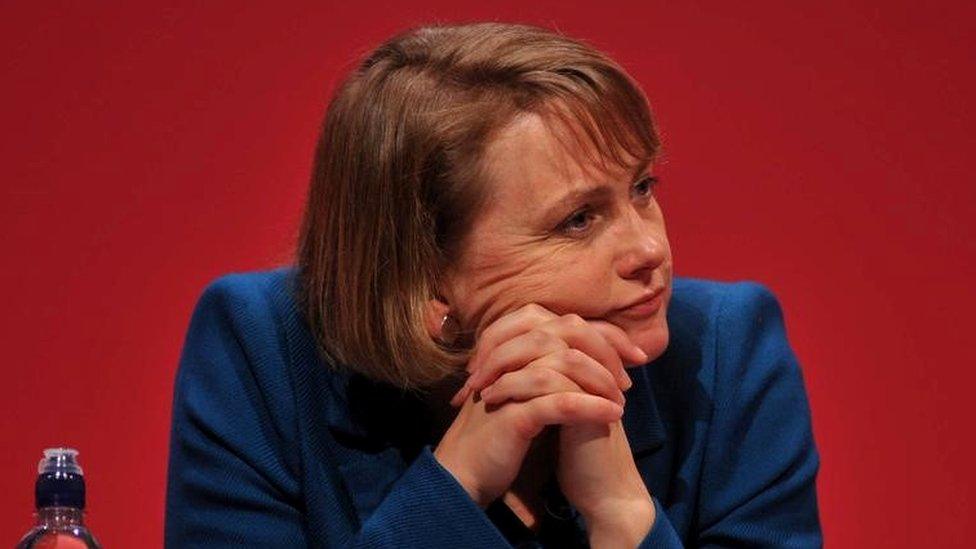
Cooper has been at the top of the party for nearly a decade
"The benefits system can promote work and responsibility but must also show respect to people. Attacking people as scroungers or workshy is deeply wrong."
She recovered and went to work as Independent's economics correspondent before becoming an MP in 1997 - as one of the 101 women who were elected under Tony Blair's leadership, and eight years before her husband Ed Balls.
But she would have to wait until Gordon Brown moved from Number 11 to Number 10 Downing Street before she was promoted from a series of ministerial posts to the cabinet - as Chief Secretary to the Treasury then Work and Pensions Secretary.
Welfare vote 'mess'
And it's Labour's attitude to welfare that might determine her future now. She argued with Harriet Harman that Labour should oppose the government's Welfare Bill.
In the end, the party laid an down an amendment then abstained.
Her leadership rival Jeremy Corbyn got credit with some party members for rebelling and demonstrating outright opposition.
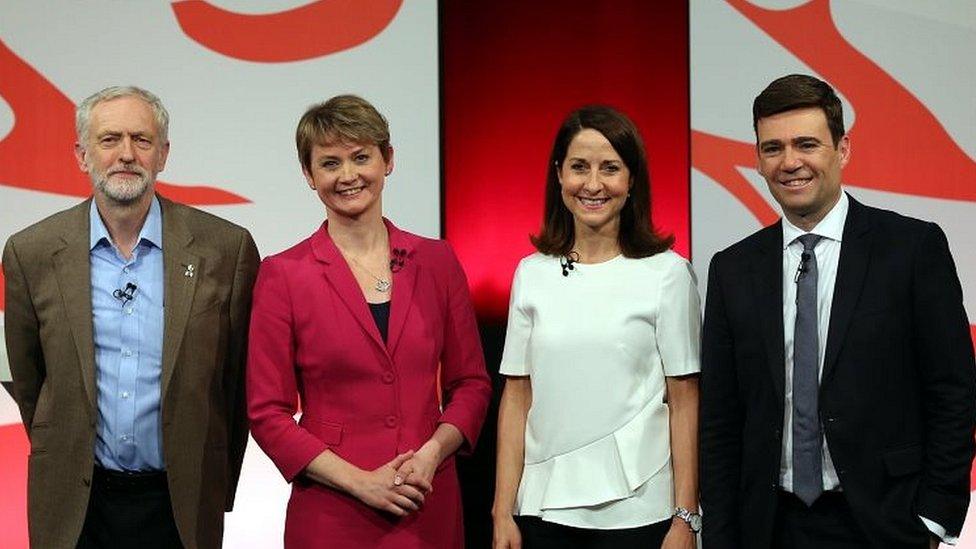
The marathon leadership contest is nearing its end
Andy Burnham saw this as a turning point in Corbyn's fortunes. I wondered if she agreed. She didn't quite go that far, but clearly felt the episode hadn't exactly been helpful.
"To be honest it was a complete mess. I always felt we should oppose the bill. It included the abolition of child poverty targets that I had worked hard to establish in the first place.
"It also included what I call 'the children's tax' - if you have three children and are in work, then - with withdrawal of tax credits - you can be worse off. But we ended up with this messy compromise. We ended with people being confused about what we stood for."
If she feels so strongly about this, why didn't she follow Jeremy Corbyn in to the 'No' lobby?
"If I am leader I will keep it clean and simple - we oppose so much of what's in the bill, we should just vote against it. But if you are in the shadow cabinet you have to try to hold the parliamentary party together but I have to say we got it wrong."
'Marxists and Methodists'
Just as the welfare row boosted Jeremy Corbyn's campaign, Yvette Cooper seemed to gain more definition and passion when she decided to speak out against him.
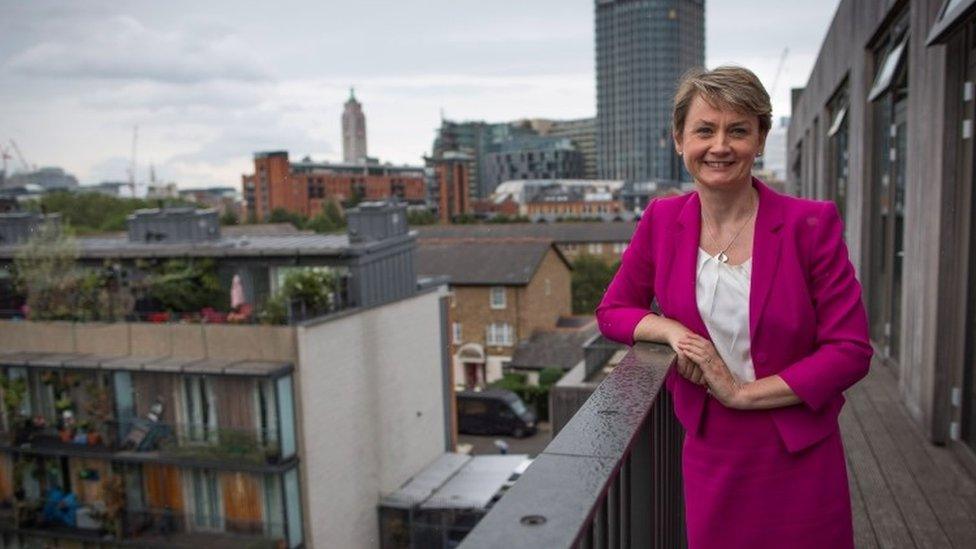
She still says it is highly unlikely she would serve in his shadow cabinet.
"I agree with Jeremy we need an alternative to Tory austerity, but I have key important differences - our membership of the EU, and NATO (she is strongly in favour of both), printing money when the economy is growing (Jeremy Corbyn's plan to get the Bank of England to increase the money supply to invest in infrastructure)."
"There are disagreements with him on these issues and it would be hard to be part of collective responsibility in his shadow cabinet.
"I won't take my bat and ball away - I will campaign for Labour to win elections. There has always been debate in our party ever since Marxists and Methodists came together to form it but sometimes there are things you just can't compromise on."
And if he wins, she warns, "people will feel let down -some of the things he promises, he can't deliver, But he will also let people down because he won't win an election".
British jihadis
If she defies the odds and has a late surge in support, what would her priorities be?
Well, she would undertake another rewrite of the totemic Clause IV of the party's constitution. Critics might see this as a gimmick.
"Clause IV is about our values as a party. It does talk about equality of opportunity. But it's not clear enough about fighting inequality which is becoming a real challenge for our economy and society."
She says she would relish taking David Cameron on, but as well as offering robust opposition she would begin developing "long term plans for our future".
But she would also face more immediate challenges. Would she support drone strikes against Britain's enemies - even if that includes British jihadis?
"Every country has to be able to defend itself and prevent imminent terrorist attacks but there must be a proper legal framework around it and safeguards in place."
As for the death of 21-year-old Reyaad Khan in Syria: "There needs to be a full review by the Intelligence and Security committee and the independent reviewer of terrorist legislation, David Anderson, should look at the details of this case."
The prime minister raised the prospect of military action in Syria at this week's PMQs - and she says she is still sceptical.
"I supported the action in Iraq as the democratically elected government asked for support.
"In Syria you have ISIL and Assad and it's not clear what the government's objectives are. The challenge for the government is to define the legal framework, the level of support in the region, and their overall strategy."
Her own strategy and level of support will come under scrutiny this Saturday - she is now battling to lead her party, but may have allowed Jeremy Corbyn to steal a march earlier in the summer.
- Published13 August 2015
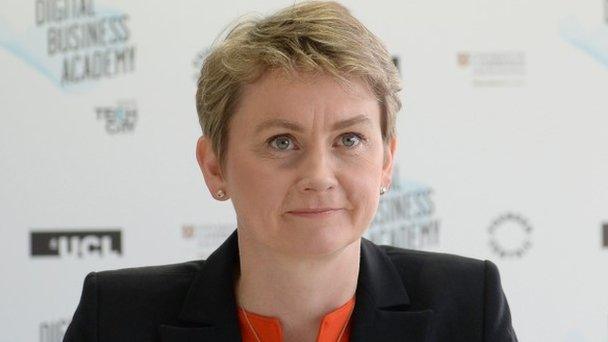
- Published14 August 2015
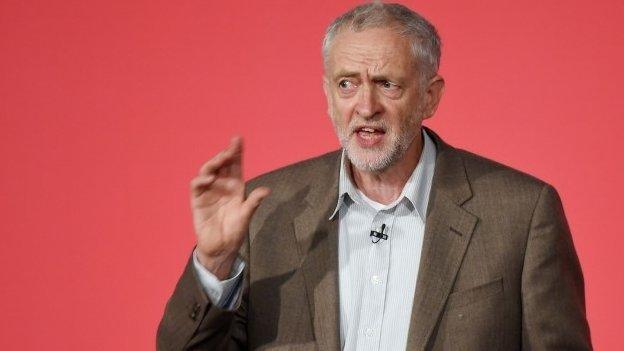
- Published7 August 2015
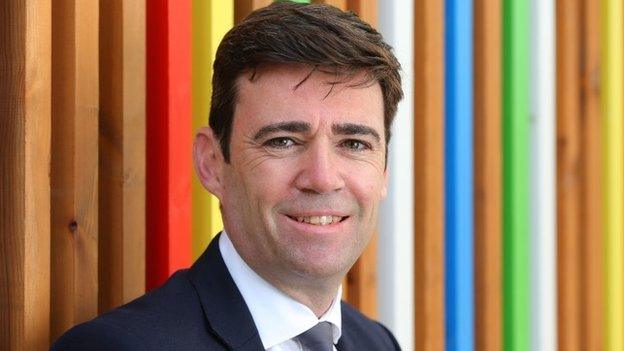
- Published12 August 2015
